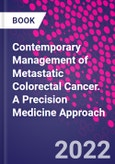Contemporary Management of Metastatic Colorectal Cancer: A Precision Medicine Approach summarizes current knowledge and provides evidenced-based practice recommendations on how to treat patients with metastatic colorectal cancer. The book presents topics such as pre-operating imaging, the use of molecular markers in treatment decisions, neoadjuvant therapy, synchronous colorectal liver metastasis, and minimally invasive approaches. In addition, it discusses immunotherapy, targeted therapies and survivorship. This is a valuable resource for practitioners, cancer researchers, oncologists, graduate students and members of biomedical research who need to understand more about novel treatments for colorectal cancer metastasis.
Please Note: This is an On Demand product, delivery may take up to 11 working days after payment has been received.
Table of Contents
1. Epidemiology and Risk Factors for Metastatic Colorectal Disease 2. Molecular Pathogenesis, Tumor Microenvironment and Future Therapeutic Targets: Colorectal Liver Metastasis 3. Pre-operative Imaging, Response Evaluation, and Surgical Planning CT, PET, Radiomics, FLR Measurement 4. Use of Molecular Markers and Other Personalized factors in Treatment Decisions (KRAS, sidedness etc.) 5. Role of Neoadjuvant Therapy in Treatment of Patients with Colorectal Liver Metastasis 6. Management of the Disappeared Colorectal Liver Metastasis 7. Approach to Small Liver Remnant Strategies to Increase Resectability 8. Two-Stage versus ALPPS for Large Intrahepatic Burden of Colorectal Liver Metastasis 9. Synchronous Colorectal Liver Metastasis Simultaneous vs. Staged Approach 10. Minimally Invasive Approaches to Metastatic Colorectal Cancer 11. Hepatic Resection of Colorectal Liver Metastasis in the Presence of Extrahepatic Disease 12. Locoregional Approaches to Colorectal Liver Metastasis Ablation 13. Locoregional Approaches to Colorectal Liver Metastasis Intra-arterial 14. Locoregional Approaches to Colorectal Liver Metastasis Radiation Options 15. Adjuvant Therapy following Resection of Colorectal Liver Metastasis 16. Long-term Prognosis and Surveillance of Patients with Resected Colorectal Liver Metastasis17. Management of Secondary Recurrence of Intra-hepatic Colorectal Liver Metastasis following Initial Hepatic Resection 18. Immunotherapy and Targeted Therapies for Colorectal Liver Metastasis 19. Colorectal Liver Metastasis: SurvivorshipAuthors
Aslam Ejaz The Ohio State University, Wexner Medical Center, Columbus, USA. Aslam Ejaz MD, MPH is a surgical oncologist who specializes in the treatment of pancreatic cancer, liver cancer, bile duct cancer and other gastrointestinal cancers. In addition to his clinical work, he is dedicated to teaching the future generation of surgeons and other cancer care providers as an assistant professor in the Division of Surgical Oncology at The Ohio State University. As a member of the Translational Therapeutics Program at the OSUCCC - James, one of his research interests is in the development of clinical trials to help patients receive new therapies that may not be available at other treatment centers. He is also interested in researching how patients do after surgery as well as addressing variations in perioperative surgical care and quality improvement. Dr. Ejaz's research is dedicated to improving cancer care, and he has published over 100 peer-reviewed papers in high-impact cancer and surgical journals. Timothy M. Pawlik Professor and Chair, Department of Surgery, The Urban Meyer III and Shelley Meyer Chair for Cancer Research, Professor of Surgery, Oncology, and Health Services Management and Policy, Surgeon in Chief, The Ohio State University Wexner Medical Center, Columbus, Ohio, USA.Dr. Timothy M. Pawlik received his undergraduate degree from Georgetown University and his medical degree from Tufts University School of Medicine. Dr. Pawlik completed surgical training at the University of Michigan Hospital and spent two years at the Massachusetts General Hospital as a surgical oncology research fellow. He then went on to advanced training in surgical oncology at The University of Texas M. D. Anderson Cancer Center in Houston. Dr. Pawlik's main clinical interests include alimentary tract surgery, with a special interest in hepatic, pancreatic and biliary diseases. Dr. Pawlik has also completed a fellowship in medical ethics at the Harvard School of Public Health, as well as a Masters in Theology from Harvard Divinity School, Boston. In addition, Dr. Pawlik received a PhD from the Johns Hopkins Bloomberg School of Public Health in Clinical Investigations. Dr. Pawlik also received his Executive MBA Program from The Ohio State University Fisher Business School. Dr. Pawlik is the Chair of Surgery at The Ohio State University Wexner Medical Center where he holds The Urban Meyer III and Shelley Meyer Chair for Cancer Research. Dr. Pawlik is a past-President of the Association for Academic Surgery, past-President of the Americas Hepato-Pancreato-Biliary Association, co-President of the Surgical Biology II Club, as well as current President of the Association for Academic Surgery Foundation. Dr. Pawlik's research focuses on determinations of factors associated with prognosis and staging of gastrointestinal cancers, as well as the economics of cancer care. He also studied patient/physician communication and patient engagement, as well as patient perception of cancer-care goals and the impact of social determinants of health.








